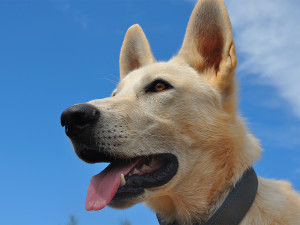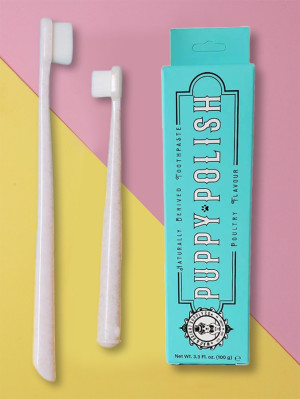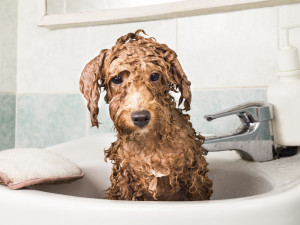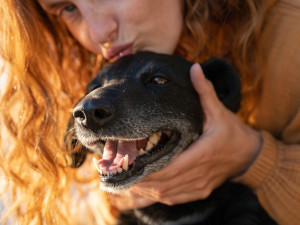How Often Should You Brush Your Dog’s Teeth?
Some things you can do to keep those chompers sparkling through their senior years.

Share Article
For a long time, dog parents just assumed stinky breath was part of... having a dog. Sometimes they eat trash (or worse), so what can you expect? These days, experts have learned more about dog health and dental care, but it turns out that not only is bad dog breath preventable — it could be an indicator of more serious health issues.
Just like with people, good overall oral health can keep your dog healthy and happy for as long as possible. To learn more about dog dental best practices, we spoke with Dr. Jamie Anderson, a board-certified veterinary dentist.
Why dental health is important for dogs
As with people, untreated dental issues in dogs can compound over time. For example, a dog experiencing discomfort or pain due to a dental issue — such as abscesses or infected teeth — may become grumpy or sensitive.
A prolonged lack of dental care can then turn into persistent symptoms — such as stinky breath or a lack of appetite — or long-term health impacts. In fact, some studies show a correlation between poor oral health and serious systemic diseasesopens in new tab, such as kidney or heart disease.

A healthy mouth’s greatest enemy: periodontal disease
Periodontal disease is the inflammation or infection of the gums and bones in your dog’s mouth. It’s also one of the most common health issuesopens in new tab faced by both cats and dogs — in part because it’s hard to catch until it‘s significantly progressed.
It all starts with plaque. Plaque that builds up on your dog’s teeth can lead to inflamed and infected gums (aka gingivitis). If left untreated, that plaque can further build up under the gum line, impacting your dog’s gums, connective tissues, and jawbone. In extreme cases, your dog can lose their teeth from advanced periodontal disease, develop an oronasal fistulaopens in new tab (a hole between the nasal or oral cavity) or face more long-term systemic health issues.
Dr. Anderson notes that some dog breeds may be more predisposed to periodontal disease than others. If you have a smaller dog breed, such as a Dachshund or Yorkshire Terrier, you will want to keep an extra close eye out for plaque.
Common signs of dental health issues
While periodontal disease is the most common oral health challenge for dogs, Dr. Anderson notes that, just like people, our pets can also get more complicated oral diseases. If you notice any of the following from your dog, you should have your dog checked out by a vet or dental specialist:
Bad breath
Broken or loose teeth
Discolored teeth
Red or bleeding gums
Behavior changes, such as loss of appetite or chewing on one side of the mouth
Excessive drooling
Bumps on the jawline
While your primary vet can provide routine, annual checkups and cleanings, they may refer you to a board-certified veterinary dentistopens in new tab for more specific dental issues, such as root canal therapy. Someone with these qualifications has specifically studied, done a residency, and passed an exam for animal dental care.
How to keep your dog’s smile fresh�
When it comes to keeping your dog’s mouth healthy, prevention is the name of the game. While you can use the following schedule as a baseline, make sure you talk to your vet to create a dental hygiene routine that fits your pet’s needs, as well as your schedule and budget.
Daily to weekly: Most experts agree that brushing your dog’s teeth daily is the best way to prevent periodontal disease and other oral health issues. However, for many, this might not be practical. If possible, try to brush your dog’s teeth several days per week or weekly.
Regularly: Check your dog for any changes to their mouth or jaw area. “When your pet yawns, you have the absolute best opportunity to get a good look in their mouth,” Dr. Anderson advises. “Take advantage of it!”
Annually: Your regular vet should conduct a review of your dog’s dental health during annual exams. Feel free to ask them questions or for a referral to a dental specialist if you have specific concerns.
Varies: Many vets recommend dogs undergo professional cleanings, in which your dog will be put under anesthesia to receive a deep clean and sometimes X-rays. When and how often vets will suggest this varies depending on your dog’s health, breed, and age.
If your dog isn’t going to sit still for daily teeth brushing, there are a ton of dental hygiene products on the market that can help with oral health, too. Dr. Anderson warns, though, that some are better than others. For example, deer antlers and Nylabones are too hard and can break your dog’s teeth.
“If a dog chews on rocks, they’re going to break teeth,” Dr. Anderson says.
Instead, Dr. Anderson recommends vetting any dental products on the Veterinary Oral Health Councilopens in new tab (VOHC) website. The VOHC reviews products and awards a “VOHC Seal of Acceptance” to those proven to help control plaque and/or tartar.
Healthy mouth, healthy dog, healthy bond
Sometimes, a dog with smelly breath is hard to snuggle with. And sometimes, a dog with a painful tooth might not want to play like usual. “The pet-guardian relationship is really affected by a diseased mouth,” Dr. Anderson says.
At the end of the day, remember that taking care of your dog’s teeth is more than just a good habit: It’s an act that can build and protect your bond with them for the rest of their life. Isn’t that worth it?
References:
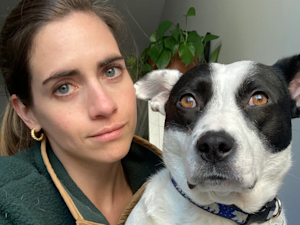
Sarah (Kollmorgen) Cottone
Sarah is a writer whose work has appeared in The Atlantic, Discover magazine, and HuffPost among other places. She lives outside of Denver with her husband and their dog, Lucy, who is the true queen of the household.
Related articles
![Photo of small terrier dog outside int he sun with mouth open, teeth and tongue visible]()
Do Small Dogs Have Bigger Dental Issues?
A new study finds that small dog breeds are at higher risk for dental disease.
![A dog getting his face scrubbed with soap.]()
7 Ways Baking Soda Can Keep Your Dog (And Your House) Clean
This pantry staple is about to become your new secret cleaning weapon.
What Is the Best Way to Clean a Dog’s Teeth?
![Outdoor shot of a woman holding her dog.]()
Doggie Dental Care: How to Choose the Best Toothbrush for a Puppy
Those pearly whites need all the attention they can get.
![Man leaning away from dog's face outside.]()
Here’s Why Your Dog’s Breath Is the Worst
It might be a sign of a bigger issue.
![Close up of red headed woman holding a black dog's face showing his teeth]()
They’re Just Like Us: Dogs Get Gingivitis
Dogs can suffer from gum disease, too. Here’s how to prevent it.


